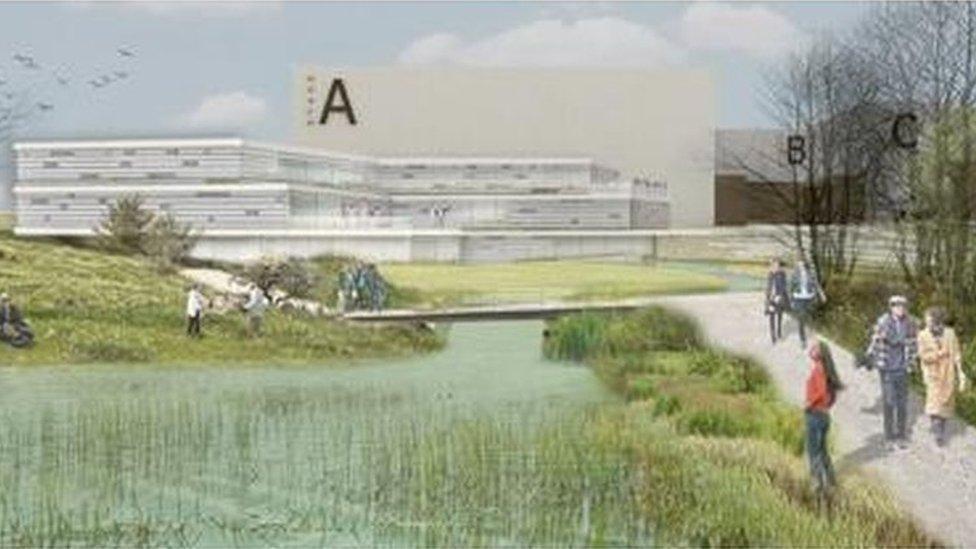Farmer wins film studio land row case
- Published

The studio was to be built on farmland at Straiton
A court has ruled that a tenant farmer cannot be removed from land which has been earmarked as the site of Scotland's new film and TV studio.
The £250m studio, which was to feature six huge sound stages, was planned for about 100 acres of greenbelt land in the Pentland hills outside Edinburgh.
Scottish government ministers gave planning permission last year.
But now the Scottish Land Court has ruled that land from two smallholdings cannot be used for the development.
Local MSPs who backed the farmer, Jim Telfer, during the case have called for a new site to be found.
Studio developers
The studio project was described by the Scottish government in 2017 as being "of national importance".
The Pentland estate in Midlothian is owned by the Gibsone family, which is keen to sell the land to the film studio developers.
But 56 acres of the site, known as Pentland Mains, are farmed by 82-year-old tenant Mr Telfer and his family.
The court said the smallholdings had been in the possession of the Telfer family almost continuously since their creation in 1915.

The Scottish Land Court had to consider whether to authorise the "resumption" of the two smallholdings farmed by Mr Telfer.
"Resuming" is a legal term referring to the process by which a landlord can, with the court's approval, take land from a croft or from common grazings, normally for development purposes.
The court judgment said the nub of this case was whether it could be said to be a reasonable purpose "having relation to the good of the estate".
'Legal rights'
It said that since the "resumption" would lead to the removal of the tenants it could not be said to be for the good of the whole estate.
Nick Gibsone, co-owner of the Pentland Estate, said: "Our family is devastated by the Land Court's decision, and its consequences for us.
"We are not by any means a wealthy family and the current estate is little more than 100 acres.
"We have spent five years trying to make the best of what we own and leave a lasting legacy that would be of benefit to the many, not the few."
Mr Gibsone said he had hoped to reach an "amicable agreement" with Mr Telfer and he had been offered "substantial compensation".
He added: "This would also enable the developers to facilitate a project of national importance and make much-needed improvements to local land, in particular restoration of a site where thousands of tons of waste material had been left by a previous tenant."
"We are disappointed not only for ourselves, and the developers, but for Midlothian and Scotland with the loss of hundreds of potential jobs and the boost to the economy the film studio could deliver.
Mr Gibsone said the land court's decision was complex and took some time to be produced.
"We must now consider all options, including appealing the Land Court's decision to the Court of Session," he said.
Pentlands Studio Limited, the company behind the film studio plan, said it was "respectful, however disappointed, to learn of the Scottish Land Court's ruling".
It said it was considering the options for the development.
The court's decision was welcomed by Scottish Green MSPs Alison Johnstone and Andy Wightman, who have campaigned in support of Mr Telfer.
They said: "Quite why the landlord, the developers and some voices within the Scottish film industry ignored the fact that a sitting tenant has legal rights that have now been upheld is for them to explain."
They called on the industry and the government to deliver the "much-needed national film studio on a site where development would be lawful".
- Published21 December 2017

- Published29 September 2016
